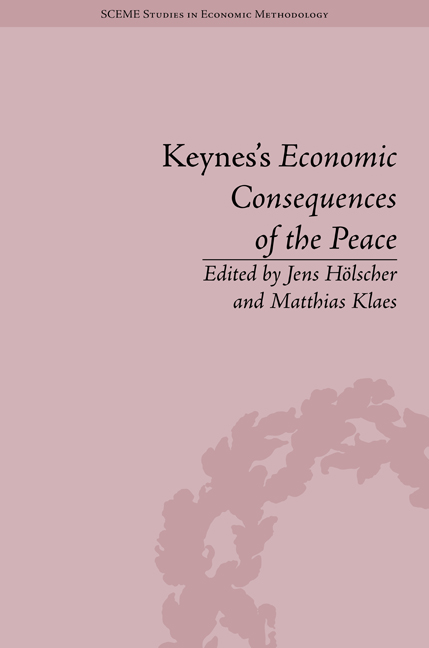Book contents
- Frontmatter
- CONTENTS
- List of Figures
- List of Contributors
- Introduction: Standing the Test of Time: Maynard Keynesas's Economic Consequences of the Peace, a Century On
- Part I The Consequences in their Time
- Part II The Consequences Today
- 5 A Methodological Reading of Economic Consequences of the Peace
- 6 Building New Monetary Institutions in the EMU as a Response to the Financial Crisis: A Keynesian Perspective
- 7 The Economic Consequences of the Euro: Lessons from History
- 8 Keynes and the Economic Consequences of the European Union
- Part III Keynes: A Play
- Notes
- Index
5 - A Methodological Reading of Economic Consequences of the Peace
from Part II - The Consequences Today
- Frontmatter
- CONTENTS
- List of Figures
- List of Contributors
- Introduction: Standing the Test of Time: Maynard Keynesas's Economic Consequences of the Peace, a Century On
- Part I The Consequences in their Time
- Part II The Consequences Today
- 5 A Methodological Reading of Economic Consequences of the Peace
- 6 Building New Monetary Institutions in the EMU as a Response to the Financial Crisis: A Keynesian Perspective
- 7 The Economic Consequences of the Euro: Lessons from History
- 8 Keynes and the Economic Consequences of the European Union
- Part III Keynes: A Play
- Notes
- Index
Summary
Introduction: Economic Consequences of the Peace in the Times of the Global Crisis
When suggesting, in a 1936 BBC broadcast, that the reader who has ‘learnt to read but [has] not yet gained experience … should live with more books than he reads, with a penumbra of unread pages, of which he knows the general character and content, fluttering round him’, Keynes did not have in mind Economic Consequences of the Peace. As many other great, highly influential essays in social disciplines however, Economic Consequences cannot avoid, in principle, this sort of destiny: that is, to be read for the first time or rediscovered many decades after its publication, at some key moments of the recent history of the global and European economies. In the introduction to a new edition of Economic Consequences, published on the eve of the global crisis, Paul Volcker wrote that in reading the book, he was struck ‘not by the felicity of Keynes's prose and the passion of his concerns but by the relevance to the world in which we live’. Remarkably, in introducing the 1983 Italian edition of the book, Marcello De Cecco observed that it included an ante litteram criticism of the deflationary programmes imposed on developing countries by the International Monetary Fund in the early 1980s.
- Type
- Chapter
- Information
- Keynes's Economic Consequences of the PeaceA Reappraisal, pp. 97 - 116Publisher: Pickering & ChattoFirst published in: 2014



